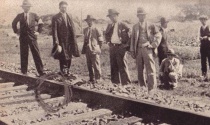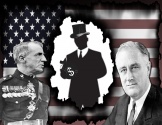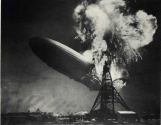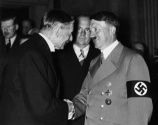Difference between revisions of "1930s"
m (t) |
(Reefer Madness) |
||
| Line 16: | Line 16: | ||
{{FA|World War II}} | {{FA|World War II}} | ||
In 1939, [[Adolf Hitler]]'s Germany staged a [[false flag]] incident, the [[Gleiwitz Incident]], and then invaded [[Poland]]. [[UK]] and [[France]] declared [[war]] as a response. | In 1939, [[Adolf Hitler]]'s Germany staged a [[false flag]] incident, the [[Gleiwitz Incident]], and then invaded [[Poland]]. [[UK]] and [[France]] declared [[war]] as a response. | ||
| + | |||
| + | ==Reefer Madness== | ||
| + | In USA, an intense anti-[[marijuana]] movement coalesced with an anti-Chicano; since marijuana was associated with Mexican-Americans, a ban on marijuana was seen as a way of discouraging Mexican-American subcultures from developing.<ref>https://www.thoughtco.com/why-is-marijuana-illegal-721155</ref> The 1937 [[Marijuana Tax Act]] levied an almost prohibitive tax on the drug and it was alleged to be a "gateway drug" that lead to [[heroin]] use<ref>https://www.thoughtco.com/history-of-the-war-on-drugs-721152</ref>, as promoted by the film ''[[Reefer Madness]]''. | ||
{{SMWDocs}} | {{SMWDocs}} | ||
==References== | ==References== | ||
{{reflist}} | {{reflist}} | ||
Revision as of 23:27, 22 October 2017
| 1920s« | |
|---|---|
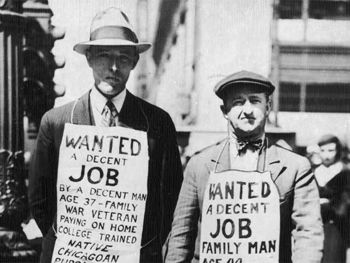 An image of the "great depression" in the US. | |
| A military build up in Europe culminated in World War II. |
The 1930s was a time of increasing concern about fascism in Europe.
Contents
Great depression
In the US particularly, widespread poverty was labelled the "great depression".
Military build up in Europe
The 1930s saw a rise in fascism in Europe, and a large military build up. Some Wall St investors, such as Prescott Bush[citation needed] and Brown Brothers Harriman helped Fritz Thyssen finance Adolf Hitler.[1]
World War II
- Full article: World War II
- Full article: World War II
In 1939, Adolf Hitler's Germany staged a false flag incident, the Gleiwitz Incident, and then invaded Poland. UK and France declared war as a response.
Reefer Madness
In USA, an intense anti-marijuana movement coalesced with an anti-Chicano; since marijuana was associated with Mexican-Americans, a ban on marijuana was seen as a way of discouraging Mexican-American subcultures from developing.[2] The 1937 Marijuana Tax Act levied an almost prohibitive tax on the drug and it was alleged to be a "gateway drug" that lead to heroin use[3], as promoted by the film Reefer Madness.

